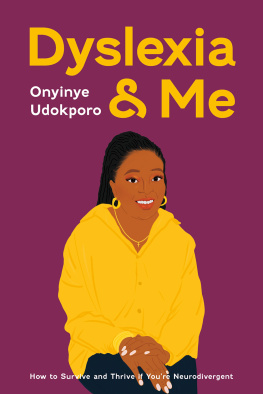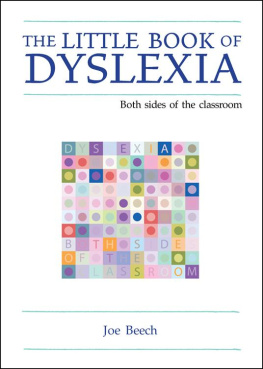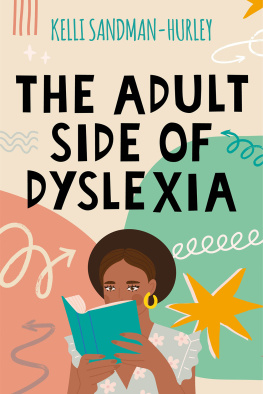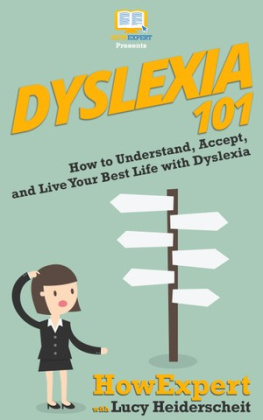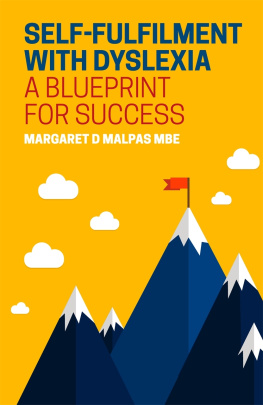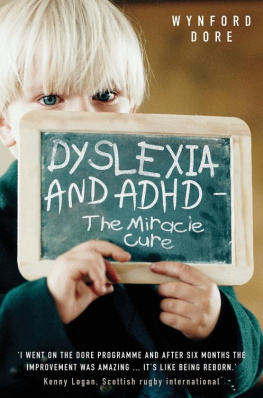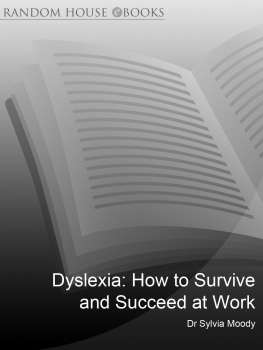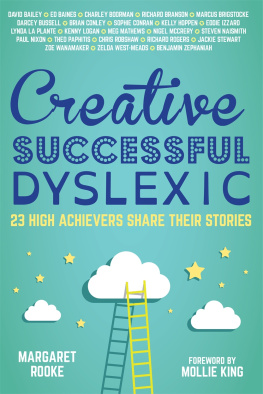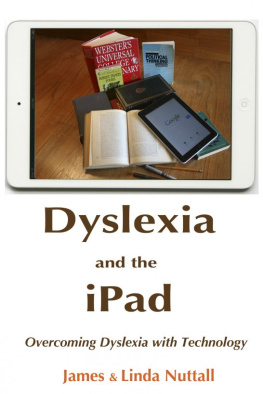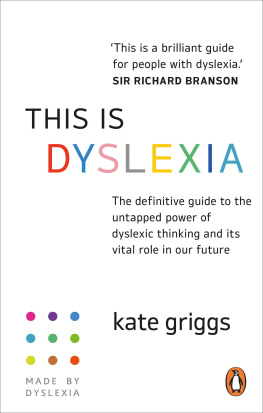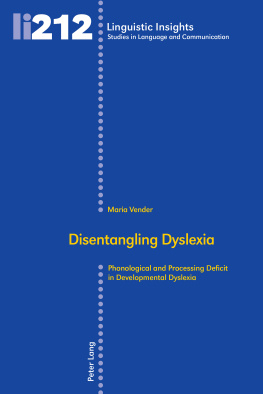Contents
Page list

You cant be what you cant see, was perhaps Onyinyes biggest barrier in life. This book shows how this barrier, present in other peoples minds and the systems they created were overcome. Onyinyes resilience and neurodivergent strengths, and her parents and others that valued her for those gifts, allowed her to smash those barriers and with this book and her enterprise help many others who still to this day face the same. With our focus on accessibility in our technology, to empower every person to achieve more, it is truly rewarding to see how this underpinned Onyinyes strength to allow her to be her true best self and light the path for others so that they can see hope and a future.
Michael Vermeersch, Accessibility Product Marketing Manager, Microsoft
This book is enriched with so many golden nuggets and tips and it highlights for me why representation matters. It is so important to be able to see ourselves in books, when talking about self-identity, a sense of belonging and breaking barriers of stigma of dyslexia from a cultural perspective. I wish I had a book like this in my teens as a young black girl, to inspire me. A common theme throughout the book is about navigating the education system and the importance of support from family, friends and educators. In my 30 years working as an educator, cultural literacy is missing from the table in our schools and university libraries. Books like this need to be embedded in our education system towards true inclusion as well as adding diversity into neurodiversity.
Marcia Brissett-Bailey, Top 50 Influential Neurodivergent Women 2022, author, dyslexic, neurodiversity advocate and champion, Observer of the BDA Executive Board and co-founder of the BDA Cultural Perspective Committee (Chair)
I thoroughly enjoyed reading this open, honest and personal account of dyslexia at different ages and levels of education. I related to many of the strategies and advice suggested. I think this book captures the importance of inclusivity and diverse role models for anyone with dyslexia.
Alais Winton, author of Fun Games and Activities for Children with Dyslexia
of related interest
The Adult Side of Dyslexia
Kelli Sandman-Hurley
ISBN 978 1 78775 475 1
eISBN 978 1 78775 476 8
The Bigger Picture Book of Amazing Dyslexics and the Jobs They Do
Kathy Iwanczak Forsyth and Kate Power
Foreword by Paul Smith
ISBN 978 1 78592 584 9
eISBN 978 1 78592 585 6
Creative, Successful, Dyslexic
23 High Achievers Share Their Stories
Margaret Rooke
Foreword by Mollie King
ISBN 978 1 84905 653 3
eISBN 978 1 78450 163 1
Fun Games and Activities for Children with Dyslexia
How to Learn Smarter with a Dyslexic Brain
Alais Winton
ISBN 978 1 78592 292 3
eISBN 978 1 78450 596 7
The Memory and Processing Guide for Neurodiverse Learners
Strategies for Success
Alison Patrick
ISBN 978 1 78775 072 2
eISBN 978 1 78775 073 9
Dyslexia
and Me
How to Survive and Thrive
if Youre Neurodivergent
Onyinye Udokporo

First published in Great Britain in 2023 by Jessica Kingsley Publishers
An imprint of Hodder & Stoughton Ltd
An Hachette Company
Copyright Onyinye Udokporo 2023
Front cover image source: Jovilee Burton.
All rights reserved. No part of this publication may be reproduced, stored in a retrieval system, or transmitted, in any form or by any means without the prior written permission of the publisher, nor be otherwise circulated in any form of binding or cover other than that in which it is published and without a similar condition being imposed on the subsequent purchaser.
The fonts, layout and overall design of this book have been prepared according to dyslexia-friendly principles. At JKP we aim to make our books content accessible to as many readers as possible.
A CIP catalogue record for this title is available from the British Library and the Library of Congress
ISBN 978 1 78775 944 2
eISBN 978 1 78775 945 9
Jessica Kingsley Publishers policy is to use papers that are natural, renewable and recyclable products and made from wood grown in sustainable forests. The logging and manufacturing processes are expected to conform to the environmental regulations of the country of origin.
Jessica Kingsley Publishers
Carmelite House
50 Victoria Embankment
London EC4Y 0DZ
www.jkp.com
Contents
Im going to start this book by introducing myself, because having an understanding of the woman I have become today will help you to make sense of my story. My name is Onyinyewchukwu Jakirichi Ekpereamaka Chiatuogo Udokporo, MA but you can call me Onyinye (pronounced: O-nin-yay). Im from London and Im of Nigerian (Igbo) heritage.
By the age of 22 I had completed two degrees. My undergraduate degree is in Religion, Politics and Society and my postgraduate degree is in Education, Policy and Society. Both degrees are from Kings College London where I received the first ever Student of the Year award, and I was named as one of the top 10 Black Students in the UK by Rare Recruitment, sponsored by the Universities of Cambridge and Oxford.
Aged 12 I started a tutoring business, and have since built it into an online tuition platform and EdTech software distributor known as Enrich Learning . I was inspired to start the business following my successful attempt, through studying really hard myself, at taking various 11+ exams, which granted me a place at the leading charitable school, Christs Hospital.
Im an entrepreneur, education expert, factual TV presenter, writer and pioneer of social mobility. Im deeply passionate about creating greater access to opportunity using education as a tool to level the playing field. As well as all the above, Im a proud, black, dyslexic woman.
I was diagnosed with dyslexia aged 11. I have always found reading, writing and spelling challenging. I dont come from a background where neurodivergence and learning differences are openly discussed. My saving grace was the fact that my parents have always had an open mind.
I found my primary school years quite hard. While in many ways I did well academically, every school report came with a but that was almost always linked to my inability to read, write and spell properly. I enjoyed studying, but it exhausted me in a way that my fellow peers could not relate to. It was especially obvious when I did homework with my three brothers.
Kachi, who is only 13 months younger than me, would fly through his homework tasks. The letters of the words for our weekly spelling tests effortlessly rolled off his tongue while I anxiously stood next to him, with beads of sweat trickling down the sides of my face as I tried to keep up. As the eldest child at home, I found homework both tiresome and embarrassing. At the time, academia for me was always accompanied with what felt like a permanent struggle. I am fortunate to have parents who did and who continue to do everything they can to support me, even if theyre not quite sure what the problem is.
Despite being members of a community that considers learning differences and neurodivergence to be taboo topics (which I say more about later in this book), my mum and dad strived to educate themselves on these matters, and in doing so, empowered me to believe that dyslexia is one of my many gifts. I built courage from seeing my parents positively embrace my dyslexia diagnosis.

